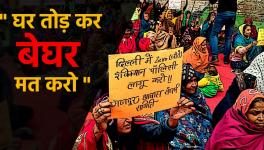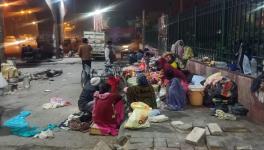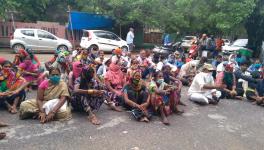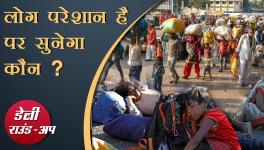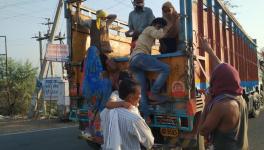After Losing Their Livelihoods, Craftsmen in Delhi’s Badarpur Mourn Demolished Houses
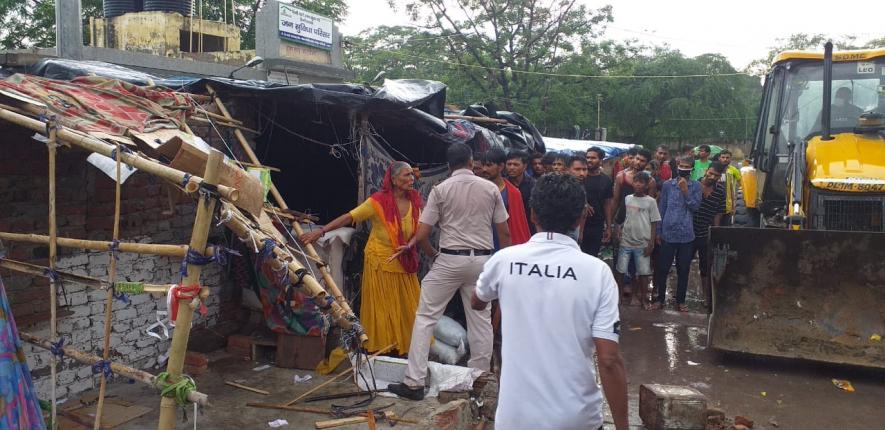
Image Courtesy: Twitter
New Delhi: Nearly 40 families of migrant and daily wage labourers have been rendered without a roof at Badarpur town in South-East Delhi after their shanties – not more than a handful of wooden poles supporting thin plastic sheds – were demolished during an eviction drive.
The episode, which could be seen as yet another case of ‘forced eviction’, was carried out by officials of the South Delhi Municipal Corporation (SDMC) along with the help of local police, on Friday, August 28.
The frail structures, home to almost a hundred, including children, were ravaged despite the multiple calls against the move by international bodies and housing rights’ activists. The organisations have been crying hoarse since March, urging the state authorities to put a stop to evictions – at least until the end of the pandemic.
The affected settlement, close to Tughlaqabad railway station, was part of a bigger informal slum otherwise known as ‘Bhatt Camp’, an area where thousands of artisans, mostly from Rajasthan, live.
Wandering around for months, teaching art, including paper craft to school-going children in different states, was a major means of securing their survival. However, life as they knew it took a tumble with schools across the country shutting down following the COVID-19 outbreak.
Taking to online to teach was an option which was not available to these informal craftspeople. Consequently, many turned to other precarious jobs and secured a daily wage to help tide them over until schools reopen.
South Delhi Muncipal Corporation has evicted 40 workers family from an informal settlements, an hour ago.These huts belong to daily #wageworkers.
Out comrades @ eviction site, & exploring possibilities fr rehabilitation & legal aid.@habitat_intl @Right2CityGP pic.twitter.com/zcIVco8csS
— wpc_india (@IndiaWpc) August 28, 2020
Thirty-year-old Jitu Rai was among them. A few days ago, his major concern was to get some work which would allow him to bring food home for his wife and three children. But, that changed after his shanty was turned into rubble in no time.
“They came on Friday and demolished everything that my family possessed,” Rai, who had been living there for close to ten years, told NewsClick. “We could only save our ration card, Aadhaar and some other belongings,” he said, mentioning that no notice was served to him prior to the demolition.
An SDMC official refused to offer any comments when asked about the incident.
Lal Chand, 48, another resident at the camp, told NewsClick that almost of who lived in the slum are on the brink – with their earnings cut to less than half of what they got pre-COVID1-9. “There could not have been a worse time to destroy the houses here than now. Most of us have been living here for more than thirty to forty years in inhuman conditions. Instead of improving them, the officials are coming after our houses,” he added.
All too well aware of what distress felt like, members of the community came forward and shared roofs for a couple of days.
This was necessitated due to the absence of any kind of rehabilitation process by the government machinery, said Nirmal Gorana, a housing rights activist with the Working Peoples’ Charter (WPC), a group of organisations working within the informal sector.
“Such eviction drives bring to the fore the scant regard of the government for the rights of the poor to own a house,” Gorana said, adding, “the process of pushing the poor to the margins of urban spaces hasn’t subsided even during a pandemic.”
The United Nations (UN) Committee on Economic, Social and Cultural Rights, underlining the importance of housing in protecting people from the viral infection, had in April this year called on the nations to stop evictions during the pandemic. In a guidance note, the former UN Special Rapporteur on Adequate Housing also emphasised the same, at a time when “stay at home” was the motto to restrict the virus spread.
The calls, however, did not prompt the Bharatiya Janata Party (BJP)-led Centre and other state governments to change how they work, resulting into a ‘business as usual’ attitude at large, causing the forced eviction of over 20,000 people between March 16 and July 31 this year, according to Housing and Land Rights Network (HLRN), a New Delhi-based group that documents and monitors such displacements.
In most cases, the drives “do not even achieve any anything,” noted Gorana, as those evicted simply shift to another piece of land, turning it into an informal settlement. “And, precisely for the same reasons, what is needed is a universalisation of housing rights,” he added.
“We will stay here; there’s no other place to go. Let the police come again. We’ll face their lathis. What other option do we have?” Rai asked.
Get the latest reports & analysis with people's perspective on Protests, movements & deep analytical videos, discussions of the current affairs in your Telegram app. Subscribe to NewsClick's Telegram channel & get Real-Time updates on stories, as they get published on our website.









